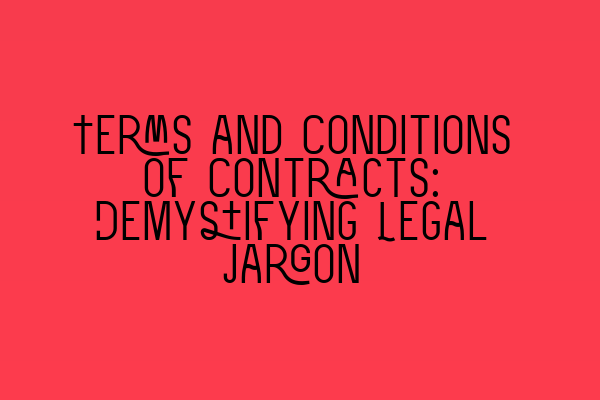Terms and Conditions of Contracts: Demystifying Legal Jargon
When entering into a contract, it’s crucial to have a clear understanding of the terms and conditions. However, the legal jargon often used in contracts can be overwhelming and confusing for many people. In this article, we aim to demystify the complex world of contract language, making it more accessible and easier to comprehend.
1. Key Terms and Definitions
Before diving into the intricate details of a contract, it’s essential to familiarize yourself with some key terms and definitions. Let’s start by defining a few commonly used terms:
- Offer: An offer is a proposal made by one party to another, indicating their willingness to enter into a contract.
- Acceptance: Acceptance is the agreement to the terms of an offer, leading to a binding contract.
- Mutual Consent: Mutual consent is the voluntary agreement of all parties involved in a contract.
- Consideration: Consideration refers to something of value exchanged between the parties, such as money or services.
- Breach: A breach occurs when one party fails to fulfill their obligations under the contract.
- Indemnification: Indemnification is the act of compensating one party for any losses or damages suffered as a result of the contract.
Familiarizing yourself with these terms will provide you with a solid foundation to better understand the content and implications of a contract.
2. Clear and Concise Language
One of the biggest challenges in contract drafting is striking the right balance between legal precision and clear communication. To ensure the terms and conditions are easily understood by all parties, it’s crucial to use clear and concise language. Avoiding legal jargon and complex sentence structures can help avoid confusion and prevent potential conflicts in the future.
Using everyday language and providing examples, where relevant, can significantly enhance the readability of a contract. By making the terms and conditions easily accessible, you can build trust and reduce the likelihood of misunderstandings or disputes.
3. Important Clauses to Consider
Contracts typically contain several clauses that outline the rights, obligations, and responsibilities of the parties involved. While the specific clauses will vary depending on the nature of the contract, here are a few essential clauses to consider:
- Termination Clause: This clause outlines the circumstances under which the contract can be terminated by either party.
- Confidentiality Clause: A confidentiality clause ensures that sensitive information shared between the parties remains confidential and is not disclosed to third parties.
- Dispute Resolution Clause: This clause outlines the procedure for resolving any disputes that may arise during the course of the contract.
- Limitation of Liability Clause: A limitation of liability clause limits the amount of liability that one party can be held responsible for in case of breach or damages.
The inclusion of these clauses can provide clarity and protect the interests of all parties involved.
4. Seeking Legal Advice
While it’s possible to navigate through a contract without legal advice, it’s always recommended to seek professional assistance. A solicitor specializing in contract law can help ensure that the terms and conditions of your contract are fair, enforceable, and comply with all relevant laws and regulations.
If you need assistance with contract law or any other legal matters, our team of experienced solicitors at SQE Contract Law is here to help. We have extensive expertise in contract drafting, review, and negotiation, and can provide guidance tailored to your specific needs.
Whether you are a startup looking to establish your LLC in the UK, need guidance on business regulations, or want to stay up to date with the latest SQE workshops and webinars, we have a range of related articles to support you:
- LLC Formation Made Simple: Step-by-Step Guide for UK Entrepreneurs
- Business Regulations in the UK: A Comprehensive Overview
- SQE Workshops and Webinars: Accelerate Your Exam Preparation
- Delaware Corporate Law for UK Solicitors: Key Insights and Practices
- Leveraging Cross-border Legal Services: A Strategic Guide
By exploring these articles, you can gain valuable insights and practical tips to support your legal journey.
Conclusion
Understanding the terms and conditions of a contract doesn’t have to be a daunting task. By familiarizing yourself with key terms, using clear and concise language, considering important clauses, and seeking legal advice when necessary, you can navigate the complex world of contracts with confidence.
Remember, our team of expert solicitors at SQE Contract Law is always here to assist you. Contact us today for professional guidance and support in all areas of contract law and more.
